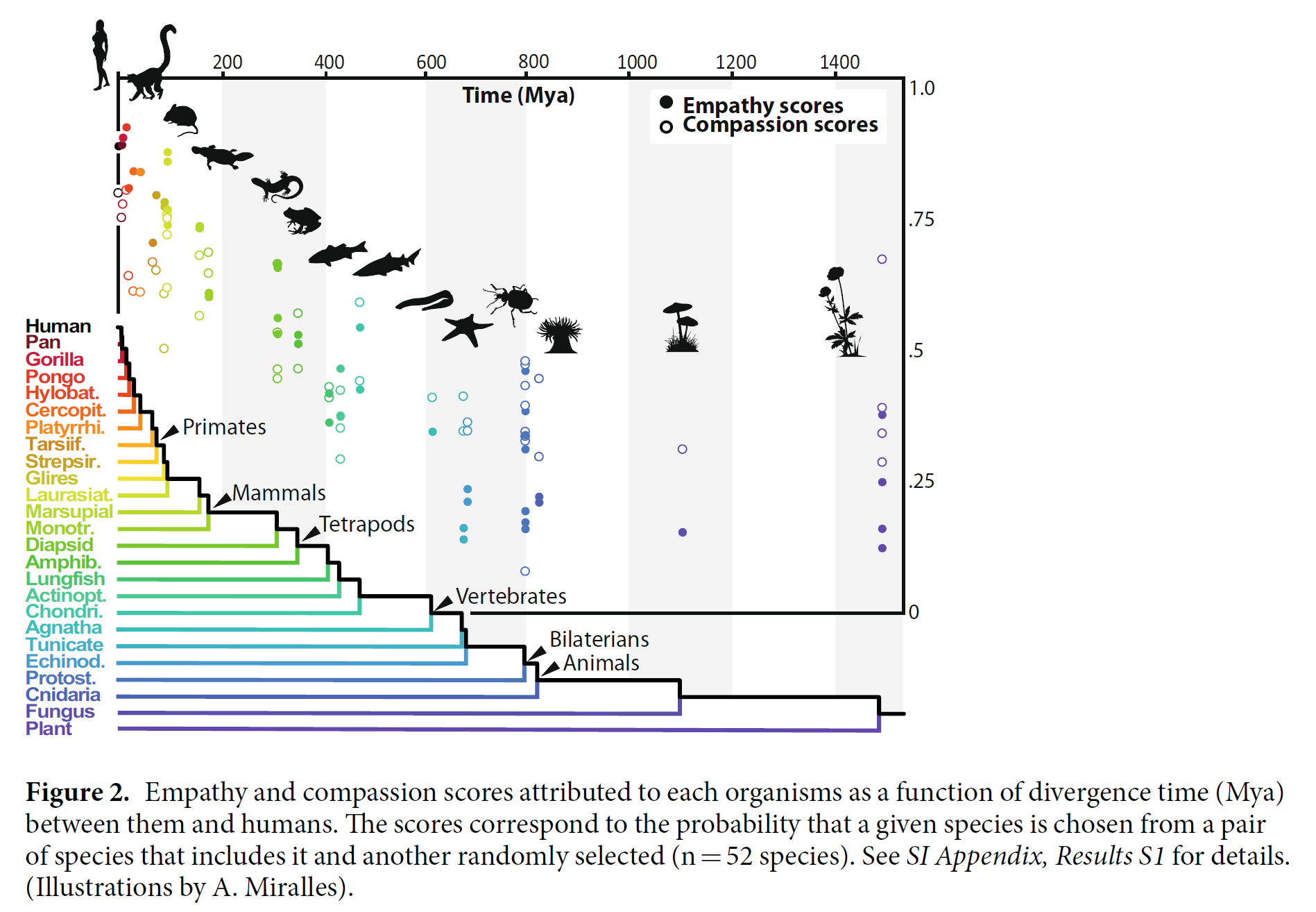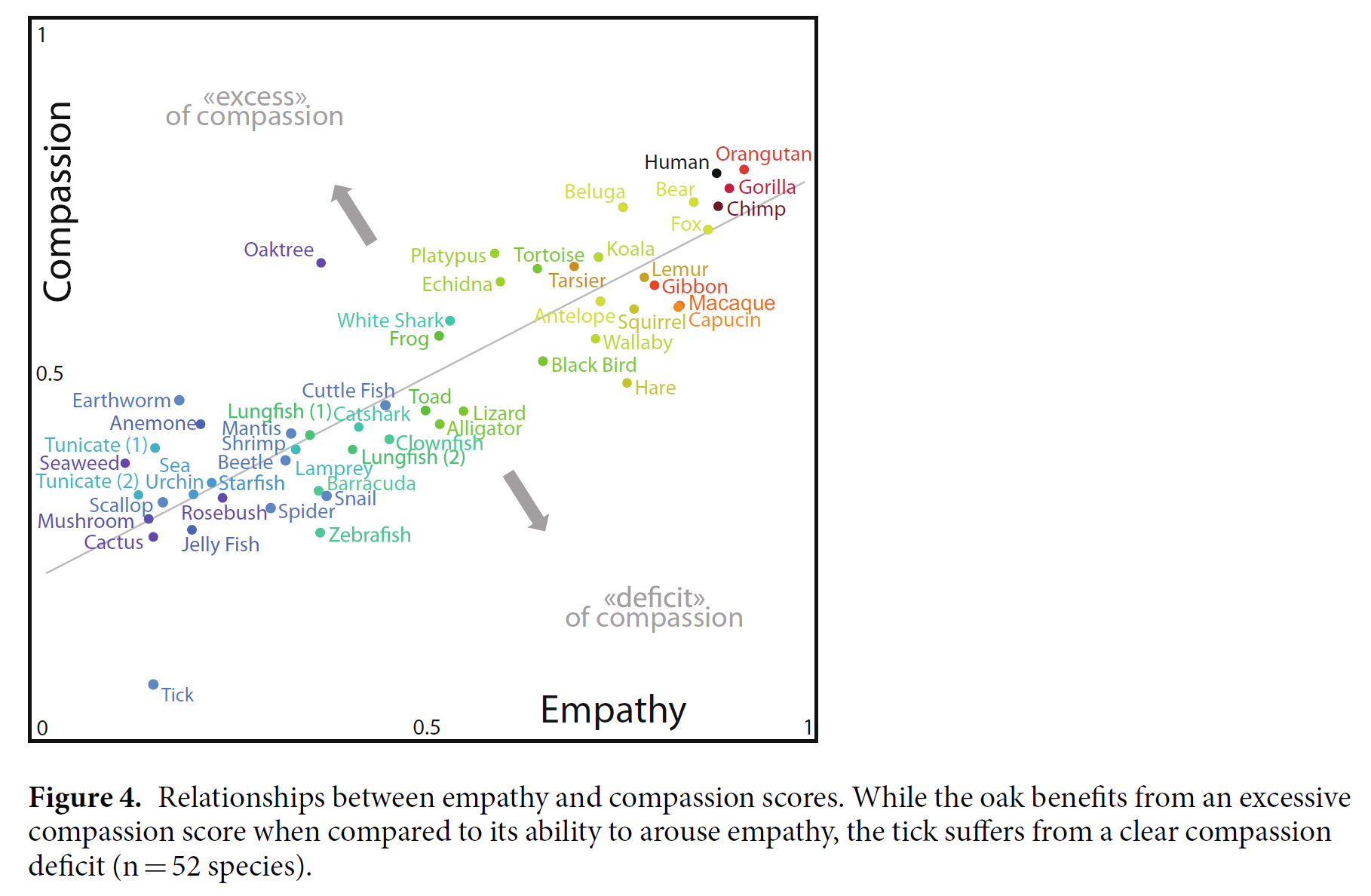Human Bias
This note collects evidence that supports the need for self-governance by all agents, including nonhuman beings. The evidence demonstrates that any dominant power, even when acting with good intentions, will inevitably introduce Bias and struggle to achieve fairness and justice, even when such outcomes align with its own interests. This issue is especially relevant in the Anthropocene, where human actions have significant impacts on the environment and other species.
Examples of Bias in Life Sciences
Preference for charismatic species
Colléony, Agathe, Susan Clayton, Denis Couvet, Michel Saint Jalme, and Anne-Caroline Prévot. ‘Human Preferences for Species Conservation: Animal Charisma Trumps Endangered Status’. Biological Conservation 206 (2017): 263–69. https://doi.org/10/f9wz8q.
But being charismatic does not help as humans end up thinking there are a lot of you.
Courchamp, Franck, Ivan Jaric, Céline Albert, Yves Meinard, William J. Ripple, and Guillaume Chapron. ‘The Paradoxical Extinction of the Most Charismatic Animals’. PLOS Biology 16, no. 4 (2018): e2003997. https://doi.org/10/gdbdmq.
Bellon, Alejandro M. ‘Does Animal Charisma Influence Conservation Funding for Vertebrate Species Under the US Endangered Species Act?’ Environmental Economics and Policy Studies 21, no. 3 (2019): 399–411. https://doi.org/10/gmqbqp.
Preference for larger body
Berti, Emilio, Sophie Monsarrat, Michael Munk, Scott Jarvie, and Jens-Christian Svenning. ‘Body Size Is a Good Proxy for Vertebrate Charisma’. Biological Conservation 251 (2020): 108790. https://doi.org/10/ghjjcd.
Preference for closer evolutionary relatives


Miralles, Aurélien, Michel Raymond, and Guillaume Lecointre. ‘Empathy and Compassion Toward Other Species Decrease with Evolutionary Divergence Time’. Scientific Reports 9, no. 1 (2019): 19555. https://doi.org/10/ggp7t9.
Thomas, Howard, Helen Ougham, and Dawn Sanders. ‘Plant Blindness and Sustainability’. International Journal of Sustainability in Higher Education 23, no. 1 (2021): 41–57. https://doi.org/10/gjq9ts.
In Europe, funding for conservation between 1992 and 2018 through LIFE projects was:
- 150 million for invertebrates
- 970 million for vertebrates
Mammola, Stefano, Nicoletta Riccardi, Vincent Prié, Ricardo Correia, Pedro Cardoso, Manuel Lopes-Lima, and Ronaldo Sousa. ‘Towards a Taxonomically Unbiased European Union Biodiversity Strategy for 2030’. Proceedings of the Royal Society B: Biological Sciences 287, no. 1940 (2020): 20202166. https://doi.org/10/gjfxkt.
This bias is contrary to the extinction risk: 26.3% of invertebrates are critically endangered, endangered or vulnerable vs 13.3% of vertebrates. (see IUCN Red List)
Preference to temperate over tropical
Culumber, Zachary W., Jaime M. Anaya-Rojas, William W. Booker, Alexandra P. Hooks, Elizabeth C. Lange, Benjamin Pluer, Natali Ramírez-Bullón, and Joseph Travis. “Widespread Biases in Ecological and Evolutionary Studies.” BioScience 69, no. 8 (2019): 631–40. https://doi.org/10.1093/biosci/biz063.
Speciesism in Conservation
Guénard, Benoit, Alice C. Hughes, Claudianne Lainé, Stefano Cannicci, Bayden D. Russell, and Gray A. Williams. “Limited and Biased Global Conservation Funding Means Most Threatened Species Remain Unsupported.” Proceedings of the National Academy of Sciences 122, no. 9 (2025): e2412479122. https://doi.org/10/g9mrn6.
Hutchinson, Alison, Nathan Stephens-Griffin, and Tanya Wyatt. “Speciesism and the Wildlife Trade: Who Gets Listed, Downlisted and Uplisted in CITES?” International Journal for Crime, Justice and Social Democracy 11, no. 2 (2022): 191–209. https://doi.org/10/g9d7xb.
Model Bias
Cf. Margulis
Ankeny, Rachel A. Model Organisms. Cambridge: Cambridge University Press, 2021.
References
Swartz, Brian, and Brent D. Mishler, eds. Speciesism in Biology and Culture: How Human Exceptionalism Is Pushing Planetary Boundaries. Cham: Springer, 2022.
Backlinks